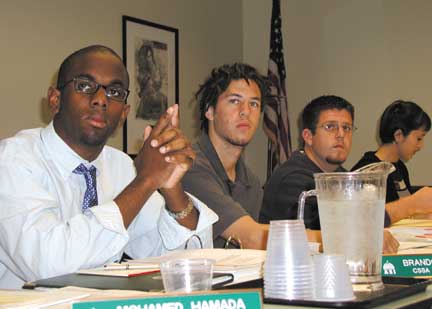ASI gives Gerth an out on MWF plan

Image: ASI gives Gerth an out on MWF plan:ASI Board members (left to right) Brandon Kline, Luke Wood, Ryan Murphy and Lisanne Nakayama at ASI’s Nov. 7 meeting. Photo by Levi Ziller/State Hornet:
November 14, 2001
The “war” between Associated Students, Inc. and Sacramento State President Donald Gerth officially ended Nov. 6 at 9:30 a.m.
That?s when ASI President Artemio Pimentel, California State Student Representative Brandon Kline and ASI Chief of Staff Kevin Greene presented a proposal to Gerth containing a recommendation to “adopt the original policy change” to Monday-Wednesday-Friday classes during “prime time” that administrators have backed since early September.
“We realize students aren?t going to look very favorably upon the third option until they look at the facts,” Greene said.
Gerth?s Oct. 1 decree ending Monday-Wednesday 75-minute classes between 9:00 a.m. and 2:00 p.m. beginning fall 2002 generated an outcry among students who felt cut out of the decision-making process. On Oct. 11, Pimentel said he and Gerth had a heated discussion over whether Gerth would reconsider his decision. During that meeting, Gerth reportedly said, “If ASI wants war, then it?s war.”
Concern that Gerth might not take student opinion seriously led Greene to refer to a “Plan B” ? which many observers considered code for an organized student protest ? before a group of more than 120 students during a special ASI meeting on Oct. 17.
In the following weeks, ASI negotiated with Gerth and scrambled to meet a Nov. 6 deadline to come up with alternatives to the Monday-Wednesday-Friday plan. The board formed a task force and divided it into three committees: one to research existing information, another to get word out to students about ASI?s efforts and a third to scientifically survey student opinion about alternatives to Gerth?s plan.
Several students sacrificed class time or late evenings to work on the project.
“That last week (before the deadline) there were a lot of late nights. Monday night I didn?t leave campus until sometime between one and two o?clock in the morning,” Greene said.
That work produced “Flexible Scheduling and CSU Sacramento: An AssociatedStudents Proposal,” a nine-page document with three plans to address campus facility use.
The first recommendation parallels a proposal under consideration by the Faculty Senate, calling for the university to “offer General Education and Core Courses within the major outside of peak scheduling periods” to force students to enroll outside of prime time.
The second suggestion asks Gerth to postpone implementing his plan indefinitely to allow time for more research: “This decision was made so hastily, without due diligence … and therefore places the decision is in question and places many students at risk of discontinuing their academic goals.”
But the third recommendation effectively ends the tension between ASI and Gerth by recommending a “phase in” of classes under Gerth?s plan.
Presumably, lower division and General Education courses would switch to a Monday-Wednesday-Friday format first, followed by others. ASI believes that the move will increase efficient use of campus facilities while promoting student access and retention.
The recommendation reads, “Having classes predominately on Monday through Thursday on this campus fosters a commuter mentality.” The report?s authors believe that more students on campus on Fridays would “create a more vibrant campus life.”
“Those options are ranked in order of our preference,” Pimentel said. “But after looking at it, we couldn?t reject the president?s idea.”
ASI now awaits Gerth?s final decision, which should come shortly after he meets with the Faculty Senate on Friday. Pimentel is hopeful.
“President Gerth was impressed with our proposal,” Pimentel said. “I think he?s really going to take it seriously. We had a good meeting.”
Unlike before, there was no talk of war.






















































































































